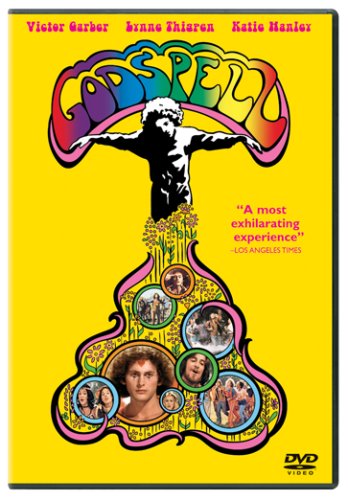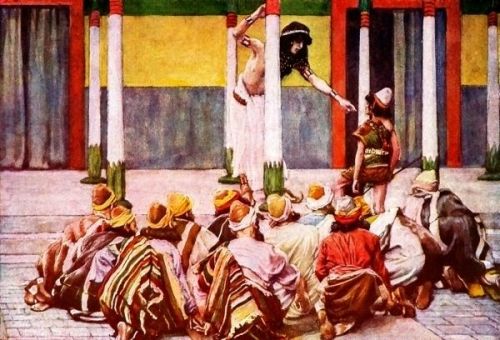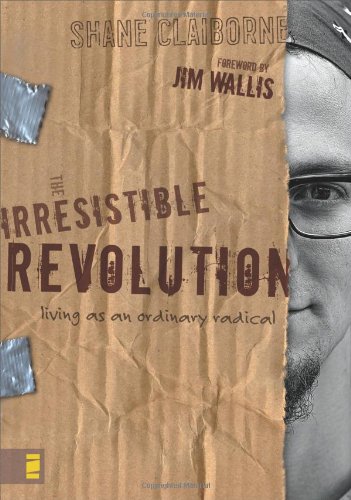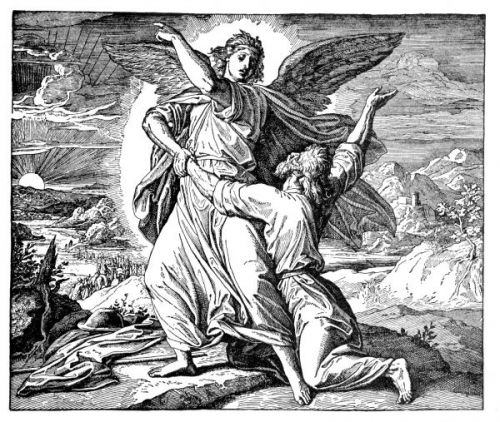Matthew 16:13-20, Lectionary 21 A, Aug. 24, 2014
Grace and peace be unto you from God our Father and from our Lord and Savior Jesus Christ, Amen.
Godspell
The movie Godspell from the 1970s begins with John the Baptist calling the disciples. These future disciples are in New York trying to make a living and dealing with all of the stresses of big city living.
The movie begins with a traffic jam. Many of the drivers are yelling at a future disciple standing in the road. They are shouting things like, “Back it out of there! Come on, back it out!” while another says, “Don’t you see that I have the right of way?” and another, “I haven’t got all day! I have places to go!” These drivers are certain that this disciple is the cause of the traffic jam. Then the disciple steps on the edge of a small wooden sign so that it stands upright. This sign reads, “Exit.” Half of the cars are heading in the wrong direction! No matter how angry these people may be, the disciple is not the cause of the traffic jam!
Another future disciple is at the library. She is at the public copy machine with one of her library books. She feeds a coin into the machine and then makes a copy. After a few more coins and a few more copies, there is a line forming behind her. Clearly the next woman in line is getting impatient. In a brazen act, this future disciple feeds one last coin into the machine and then puts her face on the copier’s glass.
A third future disciple is working as a waitress in a diner. She gives a customer his change and then opens her book. During her break, she is reading Ulysses by James Joyce. She is deeply concentrating on this book. Then she leaves it open on the counter as she pours a cup of coffee. As she is bringing it to her customer, a waiter rushes behind her, bumping her and spilling the coffee - right on her book on the counter.
These three are regular people trying to make it in New York in the 70s. They are trying to mind their own business when someone disturbs their day. Even though a wrong has been done to them, they do not lash out with anger or malice. Instead, they turn the other cheek and try to move on with their day. Of course, that is when John the Baptist starts to sing, “Prepare Ye the Way of the Lord.”
The Text
In some ways, these scenes in New York remind me of our Gospel lesson that happens in Caesarea Philippi. These future disciples are living in a secular culture when they are called to lives of ministry. So also, this happens when Jesus asks his disciples an important question in Caesarea Philippi. This place north of Galilee was filled with shrines to pagan deities. Pan was worshipped there at the grotto, and Herod the Great built a temple there dedicated to Caesar Augustus. Surrounded by these pagan and nationalistic locations, Jesus poses a serious question.
“What is the word on the street?" He asks, "What do you hear others talking about the Son of Man?” This is such a vague, impersonal question. The disciples have taken time to talk to the people they encounter. They respond that the crowds aren’t quite sure what to think of Jesus. They know that he is important, comparable to great Jewish prophets like Elijah or Jeremiah. But how Jesus fits into the larger picture of God’s divine plan, who could know?
Now, it gets personal. “How about you?” Jesus asks, “Who do you say that I am?” This is a loaded question with severe consequences. Who is bold enough to respond truthfully? Peter, of course. “You are the Messiah, the Son of the living God.” This is quite a loaded response.
Peter proclaims that Jesus is the Messiah, the Anointed One, the true king over all Israel. Thus, Peter is denying that Caesar is the true king. Then, Peter says that Jesus is the son of the living God, implying that Pan is dead and worthless. This Jesus is the real deal. Jesus isn’t just a prophet working for God - he is God.
Jesus is proud of his disciple. Peter was bold to confess the truth, given the will and knowledge to do so by none other than God the Father. Jesus rewards him not with a prize or trophy but with great responsibility. The church will be built with Peter leading the way. Jesus is giving Peter the authority of heaven, the right to teach the church what God’s law permits and forbids. These laws have already been established by God; Peter is simply sharing them.
This is a powerful scene during an important point in Jesus’ ministry. As he is slowly approaching the cross, he asks his disciples to confess his true identity. He also establishes that the disciples will continue his work after his time on earth is over. They cannot yet shout to the heavens that Jesus is the Messiah because Jesus’ time to die has not yet come. Yet, when it is time, they will be ready.
Our Part
Now that Jesus has died and been raised to new life, are we ready to proclaim that Jesus is the Messiah? We are living in our own version of Caesarea Philippi, not unlike the scenes from Godspell in New York. Our shrines to pagan idols look different these days. Instead of grottos and temples, shrines today often look like shopping malls and restaurants.
Consider 53rd Avenue in Davenport. There are clothing stores like Old Navy that are shrines to envy. There are restaurants like Granite City that inspire gluttony. So many of the stores like Bed, Bath, and Beyond are shrines to greed. There is a movie theatre that inspires lust. Even driving down 53rd sometimes invokes wrath. Each establishment tempts us to spend what we don't have and to do what we shouldn't.
When we are in this space of worship, it is easy to confess the Apostles’ Creed and proclaim that Jesus is God. But if you are out shopping and someone asks you who Jesus is, how would you respond? Do your words spoken show that Jesus is Lord?
What about your actions? If you have a Jesus fish bumper sticker on your car, those behind you know that you are a Christian. Does your driving show God’s love to your neighbor? If you are wearing a cross around your neck or on your shirt, those in the check out line with you know that you are a Christian. Are you patient and gracious? Even if you don’t have any outward signs of your Christianity, do your actions proclaim your love for God?
Conclusion
In Godspell, ordinary people were faced with everyday situations. Traffic jams, impatient people, and spilled coffee are some of those common agitators. Yet these disciples did not return anger with anger. They showed God's love to their neighbor, even if they did it in a snarky way.
Peter is the rock on which our church is built, yet we all have a part in maintaining and growing this church. This is a heavy responsibility that Jesus gave to Peter and has been handed down to us. How are you doing your part?
We cannot keep this church going on our own. Left to our own devices, the Christian church would be in shambles. Only by the grace of God can we do this. Jesus Christ has freed us from our sins so that we might be able to be ministers in all that we say and do. On the road, waiting in line, or otherwise in public, do the strangers that you meet whisper to themselves, “I think I just saw Christ”? I hope so. Amen.





